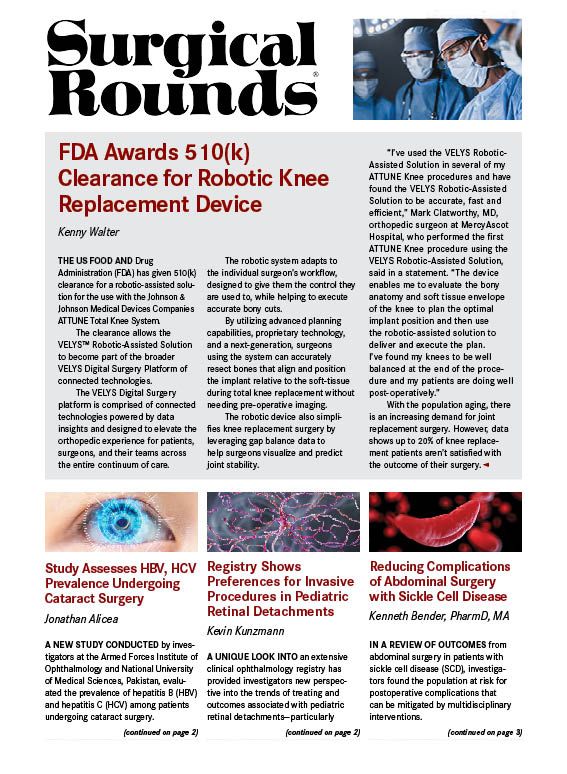Publication
Article
Surgical Rounds®
FDA Awards 510(k) Clearance for Robotic Knee Replacement Device
Author(s):
The VELYS Robotic-Assisted solution will be used in conjunction with the VELYS Digital Surgery Platform.

The US Food and Drug Administration (FDA) has given 510(k) clearance for a robotic-assisted solution for the use with the Johnson & Johnson Medical Devices Companies ATTUNE Total Knee System.
The clearance allows the VELYS™ Robotic-Assisted Solution to become part of the broader VELYS Digital Surgery Platform of connected technologies.
The VELYS Digital Surgery platform is comprised of connected technologies powered by data insights and designed to elevate the orthopedic experience for patients, surgeons, and their teams across the entire continuum of care.
The robotic system adapts to the individual surgeon’s workflow, designed to give them the control they are used to, while helping to execute accurate bony cuts.
By utilizing advanced planning capabilities, proprietary technology, and a next-generation, surgeons using the system can accurately resect bones that align and position the implant relative to the soft-tissue during total knee replacement without needing pre-operative imaging.
The robotic device also simplifies knee replacement surgery by leveraging gap balance data to help surgeons visualize and predict joint stability.
"I've used the VELYS Robotic-Assisted Solution in several of my ATTUNE Knee procedures and have found the VELYS Robotic-Assisted Solution to be accurate, fast and efficient," Mark Clatworthy, MD, orthopedic surgeon at MercyAscot Hospital, who performed the first ATTUNE Knee procedure using the VELYS Robotic-Assisted Solution, said in a statement. “The device enables me to evaluate the bony anatomy and soft tissue envelope of the knee to plan the optimal implant position and then use the robotic-assisted solution to deliver and execute the plan. I've found my knees to be well balanced at the end of the procedure and my patients are doing well post-operatively.”
With the population aging, there is an increasing demand for joint replacement surgery. However, data shows up to 20% of knee replacement patients aren’t satisfied with the outcome of their surgery.






